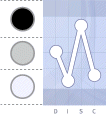|
DISCdots are a unique feature of Discus: a simple pattern of dots on a report cover sheet that sums up the key features of the results described in that report.
When you're working with DISC reports, especially if you're presenting them to others, it's sometimes helpful to have some foreknowledge of their contents. That's the purpose of the DISCdots, an unobtrusive pattern of black and white dots printed on the cover sheet of every Discus DISC report. When you print a Discus report, as long as you choose to include a cover sheet, you'll see a small pattern of dots near the lower right-hand corner. These are the 'DISCdots', a combination of symbols that, to the trained eye, communicate all the essentials of the profile. The dots are divided into three distinct sections. 
The pattern of six dots on the left combine to represent the most basic facts about a profile. For example, if the profile is compressed, or there is a significant difference between the Internal and External profile, these six dots will show different patterns to represent these different conditions. There are five possible patterns:
Finally, the small triangle or arrow symbol indicates the type of questionnaire used: 
This symbol appears beneath the four dots representing the Summary DISC factors. Its orientation and position relate to the type of questionnaire used to create the profile, Phrase-based, Adjective-based, Remote or Direct Entry. The 'Direct Entry' symbol is also used for profiles imported from other sources. |
DISC reference libraryBecome a DISC expert with our extensive online DISC reference library. Team building with DISCExplore the theory behind modelling teams using the DISC technique. |

Features
Reports
Branding
Software
Pricing
Training
Languages
Individual Reports
Agency Opportunities
DISC: A Layman's Guide
What is DISC?
Video: Introduction to DISC
DISC Profile Interpretations
DISC Factors
Team Building with DISC
History and Development of DISC
Personality Types
Applications: Putting DISC to Work
Validity and Reliability of DISC
Knowledge Base
(214) 613-3983
E-mail us
Skype us
Contact Details
(214) 613-3983
Features
Reports
Branding
Software
Pricing
Training
Languages
Individual Reports
Agency Opportunities
DISC: A Layman's Guide
What is DISC?
Video: Introduction to DISC
DISC Profile Interpretations
DISC Factors
Team Building with DISC
History and Development of DISC
Personality Types
Applications: Putting DISC to Work
Validity and Reliability of DISC
Knowledge Base
(214) 613-3983
E-mail us
Skype us
Contact Details
DISCdots: DISC results at a glance
Choose which of our great value business packages is best for you, and you'll be up and running in just a few minutes.
| Send me an Information Pack | I would like to profile myself |
Arrange a callback
| Contact name | |
| Your contact number | |
| Your e-mail address | |
| Choose a day or days that suit you best |
Monday
Tuesday Wednesday Thursday Friday
Saturday
Sunday |
| Choose a time or period to suit you (your local time) |
About AxiomGuides |
Axiom Products |
About DISC |
Personal Profiles |
Support |



